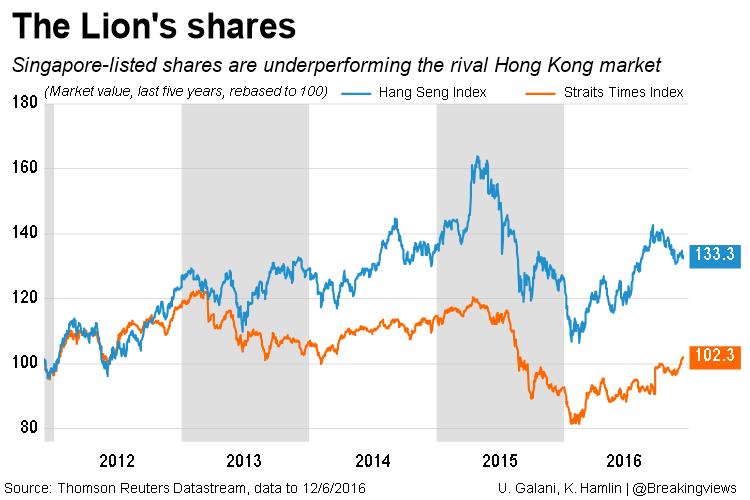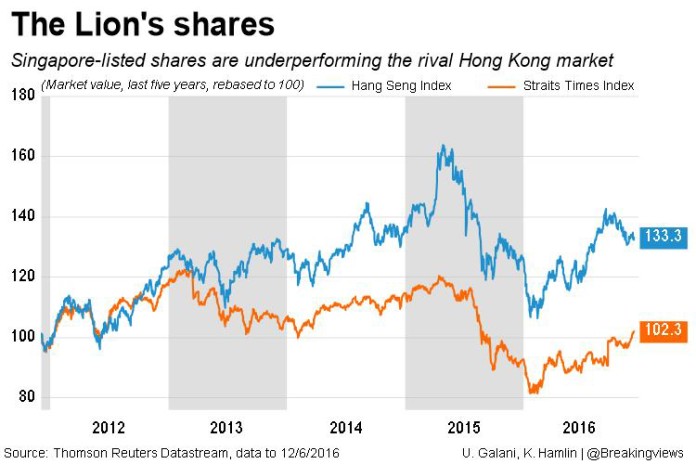HONG KONG – Morale in Singapore is at rock bottom. The tiny Southeast Asian nation has worked hard in the 51 years since its birth to establish an outsize voice on the global stage. Now the city’s economy is in the doldrums and its influence is in question as China flexes its muscles.
The Lion City is heading for a recession, or two straight quarters of economic contraction, after the trade-reliant economy shrank 2 per cent in the July-September quarter. Overall this year, the government reckons growth will be no faster than 1.5 per cent.
Prime minister Lee Hsien Loong admits low growth may be the “new normal”. Some economists call Singapore the new sick man of Asia, supplanting the Philippines, whose economy is now growing almost four times faster.
To make matters worse, high costs are beginning to bite. Dinner party conversation is one symptom of the general lack of confidence in Singapore’s direction: the elite joke about packing up and selling one overpriced home for several overseas. A recent UBS survey of top-earning millennials found Singapore’s youth among the least confident of achieving their wealth goals.
A wealth of worries
Singapore’s top problem is that global demand remains weak. That is taking its toll on export-oriented sectors, especially oil services companies, where there have been high-profile defaults. Finance is a drag too; the sector accounts for about one-eighth of GDP and is suffering from sharp declines. Big names like Goldman Sachs and Standard Chartered have pared back local operations.
The pain is most glaring in the equity market, where trading volumes are low and de-listings continue. Companies from Thailand and Malaysia also now typically prefer to float in their home markets. The market value of Singapore’s FTSE Straits Times Index is flat, compared to a 34-percentage point increase for Hong Kong’s Hang Seng Index over the past five years, Datastream shows.

And while Singapore remains a top private banking centre, its reputation as the “Switzerland of Asia” is problematic. Revelations that money from 1MDB, the disgraced Malaysian sovereign fund, flowed through the city have led to intense regulatory scrutiny. Local authorities closed down the local operations of two private banks this year, and fined others.
Another threat to this key industry comes from larger neighbours like Indonesia and India, as they aggressively crack down on tax dodging. The worry is that citizens will, sooner rather than later, not only declare a large chunk of money but repatriate it too.
Adrift
The sense of vulnerability is acute because economic worries dovetail with political ones. Singapore has traditionally looked to the West on security issues and led its Southeast Asian neighbours in championing closer ties with the United States and Japan. At the same time, it relies on China for trade and tourism, which Natixis reckons amounts to 20 per cent of Singapore’s GDP.
That position looks particularly problematic following the election of Donald Trump as the next US president. The former reality star appears unwilling to maintain his predecessor’s pivot to Asia and pledges to roll back free-trade deals including the Trans-Pacific Partnership, an agreement Singapore saw as vital to US credibility in the region.
Beijing has been quick to take advantage, using editorials in state newspapers to stress its displeasure at Singapore’s continued efforts to play a leadership role in the region. The latest skirmish involves Hong Kong authorities seizing Singaporean military equipment, which the latter insists previously passed through the territory without any problems.
China is also ramping up its cheque-book diplomacy, buying off Southeast Asian countries one by one. Philippine President Rodrigo Duterte and Malaysian Prime Minister Najib Razak have both made a show of embracing China over old Western allies, motivated in part by a desire to attract more investment. That leaves Singapore increasingly isolated.
Limited options
The options to fight back are limited. Singapore can let its currency ease in the coming months to support the economy but has no easy fix on the political side, where China has the power to make its problems worse.
Bankers worry, for example, that China might target the island nation as it moves to stem outbound capital flows. Or Beijing might let state-owned enterprises default on borrowings from Singaporean banks; loans to customers in Hong Kong and China account for more than 30 per cent of the total at DBS, the Singaporean lender with a market value of $32bil.
As long as global trade remains weak, the Lion City will struggle to roar.






